We attended the Digital Campus online event that went on for 24 hours over 3 days in more than 30 countries simultaneously. The aim is to connect young innovators around the globe using technology to support society.
Note: We've been updating the article as the event progressed.
The Campus Party digital event took place on a very colourful, easy-to-use online platform and is organised simultaneously all over the world. It is mostly targeted to students, but with hundreds of speakers from various backgrounds and with topics ranging from How to make the surface of streets interactive to The future of tourism and The future of music, I am sure there's something interesting for pretty much anybody. You can watch all presentations online linked from the agenda.
Below you can find short summaries of the talks we found most inspiring.
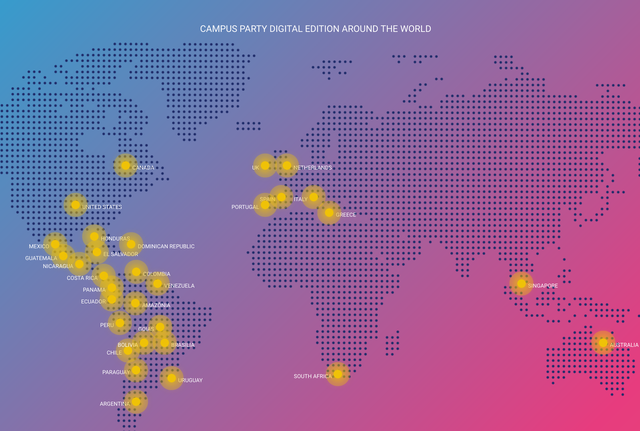
Day 1: Thursday, 9 July 2020
Leo Johnson: Do the small things
Leo Johnson, Presenter at BBC4, in his talk with the title Accelerating out the crisis, said we need to develop a new relationship between humans and technology. He clearly promoted decentralisation, redistribution and meshing over centralisation, polarisation and protectionism. He asked the audience to stop living in fear and to think about what kind of a world we want to live in. Now is the time to make good decisions. He left us with a call to do small things that resonate and can easily be replicated.
David Orban: The jolting of computer power
David Orban, advisor at the Singularity University, a company founded by Ray Kurzweil, director of engineering at Google and known for his beliefs that the human race should free itself from its biological roots and that machines will surpass humans, took it one step further and talked about the increasing acceleration of Artificial Intelligence. He calls it "jolting" of computer power which you can see in developments such as quantum technology, Artificial Intelligence and self-driving cars.
Radia Perlman: The problem is not the user
Radia Perlman, who made significant contributions to routing and to security talked about The Internet: Can we live without it? Can we survive with it? After she walked us through some pros and cons of Internet usage, Radia focused mostly on today's security issues. She said that there is a huge gap between the beauty of security and cryptography theory and the actual practice. The industry has managed to find a way to make things barely usable and least secure. As an example, she mentioned the habitual requirement for users to come up with complicated passwords containing all kinds of strange characters that users cannot remember and which also don't actually add to security.
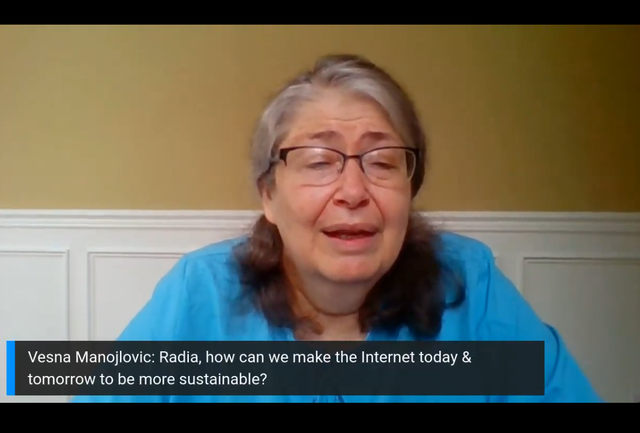
Radia answering to a question by Vesna. Her answer: "Stop blockchain and crypto currency."
You can also listen to the interview with Radia Perlman in the History of Networking series on RIPE Labs.
Day 2: Friday, 10 July
The pioners of the Internet still believe in collaboration and creativity
In this panel discussion, Sir Tim Berners-Lee, Vint Cerf and Al Gore talked about the role they played in developing the Internet and what they think needs to be done to make it a truely global communication and collaboration platform. So far only 50% of the global population has access to the Internet. There's a lot to be done to protect people's privacy. Leading on from that, there was an interesting discussion about the tradeoffs between anonymity and strong authentication and why each of these are important in certain situations or countries.
Sir Berners-Lee said he strongly believes that it is possible to build a constructive and social network where people get a kick out of solving real problems rather than just consuming. He called out to the young generation to break open the silos and to build tools that enable people to collaborate and to share and where they have control over their own data. Vint Cerf agreed and reminded people that the Internet infrastructure is intentionally designed to allow for innovation.
The panelists were amazingly optimistic and encouraging. In closing Al Gore said that over time there is usually development towards the good side. But he also stressed that "leadership matters!" Leaders who call out the bad things, will get a bad response.
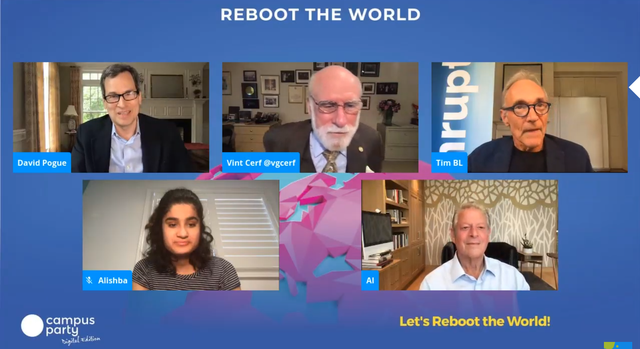
The panelists respond to a question by one of the participants
There were other interesting talks, for instance:
- Monique Morrow: Ethical Reboot in an Extended Reality
- David Noguera: COVID-19 - A virus without borders?
- Sharron McPherson #BuildBackBetter: How to Fund the Future of Learning in Africa Talk
- Panel 'Women in tech' with Veronica Ruiz Del Vizo, Cristina Pombo, Maite Sarasua, Mónica Fonseca
Day 3: Saturday, 11 July
René Scheltema: Normal is over
René Scheltema is a Dutch film maker and photographer who's been making documentaries for over 40 years. She also has a degree in criminology. In her presentation she talked about her latest movie Normal is Over which focuses on the root causes of the ecological crisis including the pandemic we are in right now. She says that all these problems are merely symptoms of a dysfunctional economical system. We believe this is the only possible system and we think that turning nature into money is normal. But there are other options. She says we need to stop accumulating stuff, and stop to create money out of nothing. Instead we should look at a circular economy and stop focusing on growth.
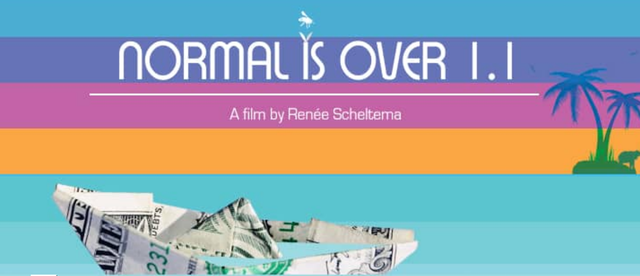
Normal is Over - The movie
Edward Snowden: Are you done clicking OK?
It is hard to summarise the one hour long conversation with Edward Snowden in a couple of paragraphs. Like other speakers, he asked the audience to check if the world we live in is consistent with the vision of how we want to live in the future. While the discussion touched on topics such as being isolated for many years, institutional power versus individual power, Huawei and 5G, Snowden talked mostly about the choices we have (or don't have) on the Internet. Clicking OK on a website or on our phone is not consent. It's a forced choice if the only alternative is to not have a phone and to not use a certain platform. When asked about requiring social media to remove certain content, he stressed that he thinks making these platforms "the hate speech police" or "the fake news police" is wrong. It should be the task of the police and the courts.
He went on to say that the Internet is in its adolescence: it is conflict-oriented, it doesn’t want to listen to anybody. It is still fairly new and software is oriented towards novelty. But just like children mature, our species and our technology also matures.
It was interesting to hear that he shares the optimism of other speakers before. He said that when looking at history, the world is better than in the past. And if we want to continue to make the world better, we have to fight and struggle. It is obvious that people care and start to become uncomfortable and that they want to change things. He suggested to start changing the outcome in small steps. Everyone can make a difference by actively making a choice to change things. He finished by stating "The world is asking you right now if it’s enough clicking OK. And I am done clicking OK!"
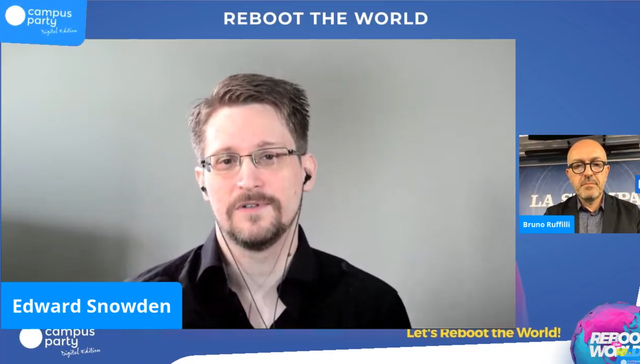
Edward Snowden answering questions from the audience
Other talks that you might want to watch:
- Nina Khera, Alishba Imran, Isabella Grandic: Young, wild, and free: pushing humanity forward as a teenager
- Marsha Maxwell: Afraid of the light: Waking up Educational Technology in the Post-COVID World
Conclusions
It was heart-warming to see so many young people interested in new technologies - and the social impact that it brings. Their focus on diversity, a sustainable future and meaningful living is inspirational.
Please let us know what your favourite talks were from the Campus Party - Digital Edition.
Appendix
Watching Live or On Demand
There are various ways to take part in this Campus Party:
- By creating an account and logging in, for ALL the features (seeing different tracks, search the agenda, be alerted of upcoming talks, watching live or on demand, rating talks, interacting... )
- Watching live on YouTube (anonymous, or with YouTube account to take part in chat and ask questions)
- Watching recorded talks if you've missed them or want to rewatch them
Tracks & Topics
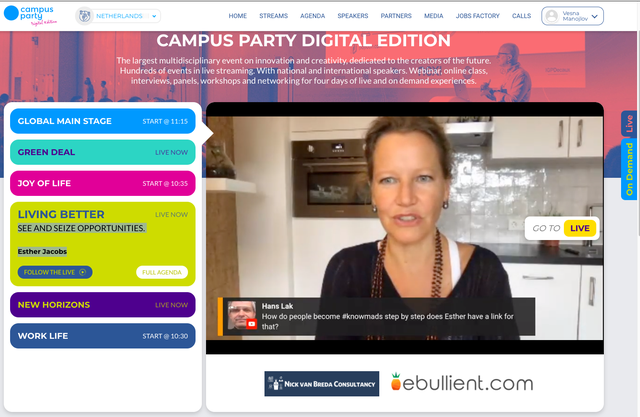
Motivational
- Morning sessions with Gitte Briffa: Unleash the Power of your Emotions
Each morning, the Campus Party event is kickstarted with soul hack sessions of Awarenest, with morning practices to unleash the power of your body and your emotions.
- Esther Jacobs: See and seize opportunities.
Find more freedom in your life, no matter the external circumstances. If you step into your power and let your light shine, you enable others to do the same.
This year, "The Cartier Women’s Initiative" has launched a new global category specifically to support women scientists and technologists in the deep tech area, leveraging business as a force for good.
Green Deal
Floor Pekelharing: Sail for the Future (Thursday, 9. July)
Sail for the Future is a group of young, creative, adventurous, wildly enthusiastic people with a no-nonsense attitude, brought together by a passion for sustainability. Our future depends on the transition to a sustainable world; how will you make your contribution?
Tessie Hartjes: Solving a $6 trillion dollar barrier with a free energy source (Friday, 10. July, 15:00 CEST)
Lightyear is a Dutch company building long-range solar electric vehicles. Learn how the company is able to turn every normal power outlet into a charging station and leapfrog the EV charging infrastructure to provide clean mobility for everyone, everywhere.
Gladys Llanes: Grassroots Innovations are the Future of Sustainability (11. July, 15 CEST)
How sure are we that our innovations are changing the lives of the 2.7 billion people in the bottom of the pyramid, getting them out of poverty? A virtual tour to grassroots communities around the world and discover how tech, innovation, and initiatives really impact people's lives.
Data Power
She's Tech presents: Data as Manipulation Weapon (Video)
This panel will discuss a scandal documented in The Great Hack (2019). In this movie, Cambridge Analytica, the firm responsible for the scandal, was dedicated to big data... Bringing this topic to the present, a big example is how the data of the Black Lives Matter movement on social media can affect the 2020 US elections and the world. Come to this panel and share how can we still have the liberty of thinking in this new era of brain washing.
With: Alline Oliveira, software developer; Caroline Dantas, Co-founder of RefatorandoCast; Ciranda Morais, Fundadora do She'sTech; Lynn Langit, Cloud and Big Data architect, Lynn is AWS Community Hero; Paula Figueiredo, Latin American Ambassador of the World Legal Summit.





Comments 0
The comments section is closed for articles published more than a year ago. If you'd like to inform us of any issues, please contact us.